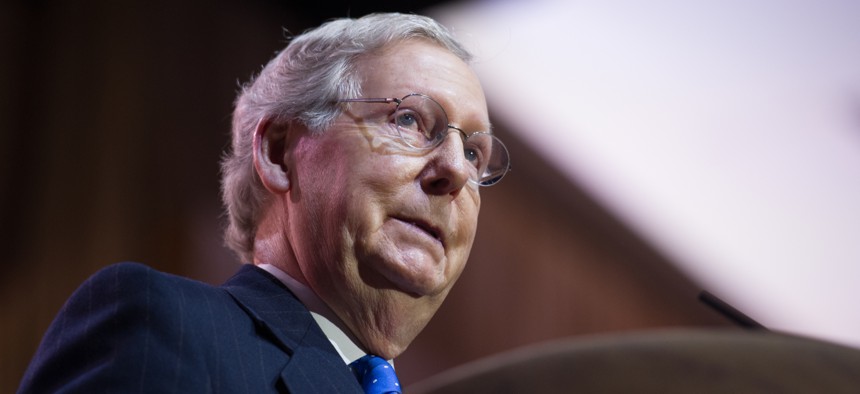Mayors to Senate Republicans: ‘Start From Scratch’

U.S. Sen. Majority Leader Mitch McConnell Shutterstock
“If you didn’t like the previous GOP health care plans to repeal the [Affordable Care Act] and to replace it, you’re definitely not going to like the one that actually just last night went down in flames,” said New Orleans Mayor Mitch Landrieu.
New Orleans Mayor Mitch Landrieu’s analysis of the current state of the Republican health care bill on Capitol Hill is simple.
“If you didn’t like the previous GOP health care plans to repeal the [Affordable Care Act] and to replace it, you’re definitely not going to like the one that actually just last night went down in flames,” Landrieu said on a conference call on Tuesday with mayors from across the nation.
The U.S. Senate’s plan to repeal and replace the Affordable Care Act is indeed dead, for now.
And, Senate Majority Leader Mitch McConnell’s near-immediate pivot to a plan that would call for a delayed repeal without a replacement at the ready—a strategy that President Trump endorsed via Twitter—may be doomed as well.
City executives have a message to Congress as they plot the path forward—and that’s to take a step back.
In fact, mayors are calling for Congress to “start from scratch.”
The message from Columbia, S.C. Mayor Stephen Benjamin during Tuesday’s call, which was organized by the U.S. Conference of Mayors: “We believe this is an opportunity for mayors, governors and other elected officials from this great country to come together in a bipartisan manner with congress to craft bipartisan legislation that will fix our nation’s health care system and increase our access to high quality affordable health care.”
Congress should see this as time to “get this done right, not necessarily [to] get this done fast,” added Landrieu, recognizing that the prioritization of expediency over consensus was a factor that led to the demise of the Senate’s health bill. “We have to slow down and craft a bipartisan bill that works for all Americans.”
The mayors on the call also urged Congress to take advantage of their on-the-ground understanding of the health care system by involving city leaders in future health care discussions.
“We want to work with the senators,” said Dayton, Ohio Mayor Nan Whaley, adding “we recommend a working group. We think there are ways we can lower cost and increase quality.”
But, at the same time, Whaley made it clear that what she sees coming out of Washington, D.C. right now leaves her ambivalent about the future.
“Playing a game of ‘what Ted Cruz wants in this bill’ is not the way that we’re going to be able to move our country—and not Ohio—forward.”
Mayors weren’t the only ones who took the time on Tuesday to offer their assistance to Congress. A bipartisan group of eleven governors issued a statement on recent developments to the health bill debate. The governors included in their statement this request for collaboration:
“Going forward, it is critically important that governors are brought to the table to provide input, and we stand ready to work with lawmakers in an open, bipartisan way to provide better insurance for all Americans."
Amid all this talk of the future, at least one of the mayors on Tuesday’s call doesn’t necessarily think the Senate’s health bill is entirely in the past.
Mayor Landrieu, speaking with the somewhat jaded attitude of a public servant who has seen the GOP health bill effort resurrected too many times to count, made sure to hedge his bets.
“We’ve been around this block a number of times,” he said, adding that the bill “looks dead at the moment but you never know.”
Quinn Libson is a Staff Correspondent for Government Executive’s Route Fifty based in Washington, D.C.
NEXT STORY: How an ‘Old Retread’ Like Jerry Brown Has Triumphed Over Chris Christie






